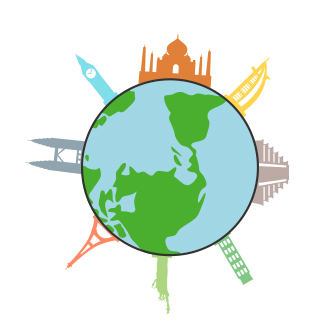Investment In Bangladesh
Investment in Bangladesh - Potential Sectors for Investment
Bangladesh is one of the fastest growing economies in the world. A recent report of PWC, a renowned economy reviewer projects that Bangladesh is going to be the 23rd largest global economy in the world by 2050 which is another good news for the investors. The investors who are intelligent and far-sighted, forward looking may be able to take this unique opportunity of investment advantage in Bangladesh. Its business friendly policies, suitable geographical location and skilled labour force at cheap wages are the basic facilities to beacon the entrepreneurs .
The potential investment areas in Bangladesh are power generation, distribution and exploration of gas and other mineral resources, highway development including bridge, express-way and tunnels, Port infrastructure facilities, Industrial parks/private export processing, computer software and electronics, diversified jute goods and jute based pulp and study, chemicals and petrochemicals, LP gas, environment friendly insecticides, leather and leather goods, tourism, food processing, Fruit canning and allied products, sports goods, light, engineering and agro-based industry etc.
Agri-business Sector

The abundance of natural resources available in Bangladesh supports a range of highly profitable investment opportunities in agribusiness. Over 90 varieties of vegetable are grown in Bangladesh, yet in this fertile land there is under utilisation of the country’s agricultural capacity. This presents many opportunities for investors seeking to export agricultural products, or to meet the rapidly growing local demand .
Investment Areas
- Agri-input sectors like seed, fertilizer, Pesticide, irrigation & Farm Machinery
- Post-Harvest infrastructure
- Food processing like eligible oil, rice, sugarcane, potato, fruits & vegetables & spices
Special Incentives
- 100% foreign equity is allowed (Except for defense, nuclear energy, currency and forest plantations)
- Tax incentives for 5-7 years based on location and industry dependent
- Cash Incentives: electricity consumption special rebate of 20% to agro-processing sector
- Tariff-free access to European union
- Cash incentives and export subsidies for selected export products ranging from 5% to 20%
- Loan disbursement target in agriculture is USD 2 Billion
- Entrepreneurs Equipment Fund is allowed agro-sector
- More than 47.5% of population dependent on agriculture for livelihood
Garments & Textile Sector

From spinning to weaving, from knitwear to leisurewear and high street fashions, the textiles and clothing industry is Bangladesh’s biggest export earner. Our factories design and produce for the world’s leading brands and retailers. This rapidly growing sector of the Bangladeshi economy offers a unique competitive edge that supports profitable expansion into new strategic markets.
The growing trend in the textile and the garments sector means that Bangladesh is perfectly positioned to appeal to foreign investors.
- Cost and quality of products that are produced on time, reliably and very competitively with a highly skilled labor force.
- A unique regional location for expansion into key Eastern and other markets.
- Favored trading status with the EU and the USA.
- Clusters of companies providing a local supplier base with real depth in skilled labor, training and technical development facilities
ICT Business Sector
ICT and its related business services in Bangladesh are a vibrant sector supported by an enthusiastic culture and a government committed to providing a pro-business climate for all investors. Over 400 IT companies are now thriving in the country supplying to local and international markets worldwide.
- Over 800 IT companies are now thriving in the country and capturing a significant share in the international markets worldwide.
- Total estimated IT Industry Size is US$ 120 Million (including export)
- Software contributes around 44% to the overall industry revenue, whereas ITES contributes around 56% to the overall industry revenue.
- Approx 30000 professionals, majority IT and other graduates, are employed in the industry. In terms of creating high-quality employment software and IT service industry is surely one of the top graduate employment sectors in the country.
- Total investment in this sector is more than 50000 crore and this sector is the largest contributor to FDI in Bangladesh.
- Online outsourcing, data entry and call center business are flourishing.
- In the next 5 years, 1% of the country’s total GDP will come from the software and IT services sector.
Leather and Leather Goods

Bangladesh has a long established tanning industry which produces around 3-4% of the world’s leather from a ready supply of raw materials. The country is therefore an established and attractive location to source and outsource the manufacture of finished leather products. The leather industry is ideally suited to Bangladesh with its abundance of labor and natural resources at internationally competitive rates.
- Contributes more than 54.69 billion USD annually to the Economy
- 207 tanneries can produce 300 million square feet crust leather and 140.39 million square feet finished leather
- Employment is about one lakh
- Leather sector crossed the $1 billion mark in annual exports in 2015-16
- The sector is included as “Thrust sector” highest priority is Footwear Leather Goods
Light Engineering Sector

The burgeoning domestic market and the prospect of significant cost reductions for companies sourcing components and finished goods for international markets makes Bangladesh a compelling choice for investors .
- 40,000 light engineering workshops/enterprises operating. About one million people and innovative entrepreneurs are actively engaged
- Annual turnover is US$ 1600 million of which Import substitute products is around US$ 200 million
- Over 90% of light engineering industries are serving the local needs of the people.
- 10% cash incentives for export
- Availability of trainable labors at competitive cost
- Declared as special development sector in its Export Policy
Electric & Electronic Sector

The high skill, low cost labor resource of the electronics sector in Bangladesh offers companies great returns on investment. Whilst the global market for semiconductors is worth in excess of $200bn and is dominated by the Asian economies, Bangladesh has significant financial and economic factors in its favor that make it the best choice for many companies.
- Global Electrical and Electronic products are highly branded. Bangladesh is producing mostly for the domestic market.
- Bangladesh encourages private sector investment with 100% foreign ownership.
- Aprox USD 9bnmarket demand while local production approx. USD 1bn
- More than 3000units are in operation, creating employment (direct and indirect) 1 million & 0.4 million
- Major Import substitution opportunity exists
- Middle class consumers of Bangladesh consist population more than Malaysia, Singapore or Thailand
Power Sector

Bangladesh is progressing through a phase of development where automation is the key to its economy and business. As the country continues to industrialize the importance of power generation and electricity supply becomes a key government priority.
- The government has given top priority to the sector considering its importance in the overall development of the country.
- As the country continues to industrialize the importance of power generation and electricity supply becomes a key government priority.
- At present, 48.5% of the total population of Bangladesh is enjoying the electric facilities.
- Total demand is projected to be more than 12000MW in 2017.
- Bangladesh needs total USD 18 billion investments in the power sector to minimize this demand-supply gap
- Public and private sector produce 63% and 37% of electricity respectively.
- The power sector is a capital-intensive industry, huge investments are required in order to generate addition to the capacity.
- USD 40 billion investment will be required for new generation and USD 8 billion for transmission network.
- Private sector Power Generation Policy of Bangladesh has offered attractive fiscal and non-fiscalincentives.
Pharmaceutical Sector

The pharma industry of Bangladesh is now on the verge of entering highly regulated overseas markets like USA and Europe. In this connection, several pharma manufacturers have already made huge investments in their new state of art manufacturing facilities. A number of companies have already obtained or in the process of obtaining UKMHRA, EU, TGA, AUSTRALIA and GCC certifications.
- Export earnings reached USD 82.109 million in 2015-16
- Exported to more than 83 different countries over the last 7 years, an export growth rate recorded 25.5% annually.
- Bangladesh holds the 14th position in 17 regional markets surveyed in BMIs Pharmaceutical, also occupies 67th position in BMI’s pharmaceutical universe.
- Growing at 24.63% annually and it is now a billion dollar market (doubled in the last 4 years)
- Pharmaceuticals market projected to grow to 2.00 billion by 2017
- Domestic manufacturers account for 97% of the drug sales, remaining 3% is imported.
- About 5,600 brands of medicines are manufactured
- 257 registered companies, 1,495 wholesale drug license holders, and about 37,700 retail drug license holders.
- API park where 40 API industries will be able to operate.
- Bangladesh has the most liberal FDI regime in South Asia
- The WTO TRIPS agreement permits Bangladesh to reverse-engineer patented generics till 2033 to sell locally and export to markets around the world.
Ceramics Industry

Traditionally, the tableware industry is labor-intensive and companies in developed countries experience difficulties in remaining competitive. Bangladesh, being a gas-rich and low-labor-cost economy, is perfectly positioned to be a strategic partner in production and supply of ceramic products. Investment interests in this sector are strongly welcome.
- The global ceramics industry is worth more than $10bn.
- Bangladesh produces a high-quality bone china.
- Bangladesh exported to about 55 countries, amounting to about USD 376 million in 2015-16
- The export destinations are EU, USA, Italy, Spain, France, New Zealand, the Netherlands, Australia, Sweden and the Middle East.
- 54 ceramic manufacturers are operating in Bangladesh, creating employment of 0.5million.
- Investment in this sector is worth USD 462 million with the possibility of expanding.
- Demand is USD 250 million & Bangladesh produced USD 233 million worth products in June, 2017.
Tourism Sector

Bangladesh is a unique tourist destination where one can find the scopes for all kinds of tourist interest as well as investment. Bangladesh has taken some commendable initiatives including creation of tourist accommodation and amusement facilities across the country. Government of Bangladesh has recognised tourism as an industry and framed a new National Tourism Policy in 2010 for the development of domestic and international tourism in the country. The government has also enacted ‘Tourism Protected Area and Exclusive Tourist Zone’ Law in 2010 for attracting foreign investments in these ETZs.
Bangladesh offers lucrative and competitive opportunities for the foreign investment to create multi-faceted tourist facilities around the tourist sites. At present, private investment in this sector is gradually increasing due to the government pro-foreign and private sector tourism-friendly policy. Foreign investment in the tourism sector of Bangladesh is always welcome.
- Tourist spots the country such as Cox’s Bazar, Kuakata, Kantajee Tample, Saint Martin’s Island, Sonargoan, Sylhet, Sundarbans, Ramsagor, and so on have attained huge number of tourist
- About half a billion USD was earned from the tourism sector in 2017.
- People of Bangladesh are very hospitable and tourist friendly.
- Unique archaeological sites, cultural heritage and eco-tourism products like the world’s largest mangrove forest, the Sundarbans, the world’s longest unbroken sea beach in Cox’s Bazar (120km), the oldest archaeological site in the Southern Himalayas-Paharpur and world’s largest terracotta temple – Kantaji Temple in Dinajpur, and spectacular monuments and mausoleums of language movement and liberation war of the country.
- The WTTC predicted that by 2023, travel and tourism will directly generate 2 million jobs and support an overall total of 4 million jobs, or 4.2 percent of the country’s total employment.
- This would represent an annual growth rate in direct jobs of 2.9%
Frozen Foods

Frozen foods is the second largest export sector of the economy. The massive natural resources available in Bangladesh make this sector particularly promising for investors looking to supply in international as well as in domestic markets.
- The government is promoting semi-intensive shrimp farming.
- Shrimp processing and export industry is largely dominated by the small business sector.
- Government has developed initiatives of quality assurance for frozen foods in co-operation with exporters.
- 15% cash incentive offered to shrimp export amount.
Health Care Sector

- Around Two Billion Dollars of the untapped Healthcare, the market is now in Bangladesh.
- Bangladesh spends around 2.04 billion US dollars abroad for medical treatment in a year. This amount is 1.94 percent of total GDP of Bangladesh.
- The demand of Health Care growing 21% annually.
- The demand for health care services is accelerating because of increasing purchasing power of the growing middle and upper middle classes.
Medical Equipment Sector
- The medical device market is projected to USD 243.6 million in 2018
- Hospitals in Bangladesh experienced up to 22.5% growth in patients in 2011
- The large medical equipment market of Bangladesh is almost import dependent
- Medical equipment manufacturing is a potential sector to invest and set up plants in Bangladesh
- Huge private hospitals in recent years represent the best opportunity for selling expensive high-end equipment and medical devices.
- Government builds hundreds of new healthcare facilities and upgrades existing facilities and equipment.
Renewable Energy Sector

- Economic growth of 7% calls for the scalability of its power infrastructure to keep up with the demands of industry and increased urbanization.
- Currently, renewable energy makes up 2.5% of the total electricity generation
- The importance of an alternative source of energy in Bangladesh.
- Solar energy is the most prominent source of renewable energy
- Successfully implemented one of the biggest Solar Home System (SHS) projects
- Around 3 million SHSs have been successfully installed
- Hydro power, Micro, mini and pico hydro power plants can also be used
Automobile Sector
- Local Demand USD 2.5 Billion
- Raw Material Source 5:95 (Local: Imported)
- Future Investment Possibility: USD 2.5 to 3 billion
- Future Employment option: 1.5 Million
- Import Situation: 2.01 Billion
- Nearly 60% of the total population is economically active and almost a million graduates enter the workforce annually
Ship Building Sector
- Number of Companies: 130
- Ships made in Bangladesh are 15% cheaper than even Chinese ships and are of the same quality
- The productivity of labors is good & average hourly labor charge in is only US$ 1.00
- Global shipbuilding market size is US$ 1,600 billion. 1% of the global order for only small ships market the amount will be worth US$ 4 billion for Bangladesh
- Present capacity is 0.84% of global shipbuilding production
- Declared as “Thrust Sector” in a different policy.
- 5 %t incentive on export